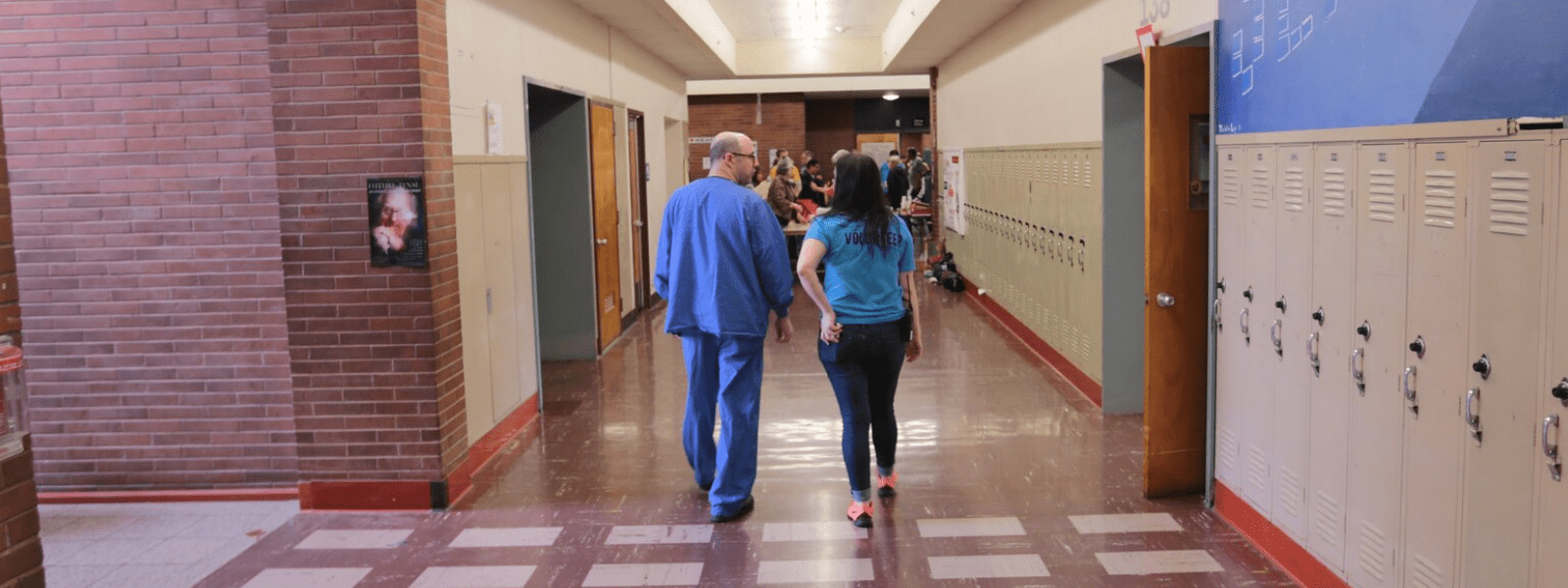For the past six years Estefany D. has been volunteering as an interpreter at Compassion Clinics all over the Portland metro area. She first discovered Compassion Clinics at 18 years old when she attended as a guest, but she quickly realized she had a skill–speaking Spanish–that could help countless other Clinic guests access essential health services. Estefany’s volunteer journey has not only allowed her to help others in a deeply meaningful way but has also provided the perfect environment for practicing Spanish which has led to a career in medical interpreting! We’re very grateful to Estefany for sharing her inspiring story with us.
“I actually found Compassion Connect as a patient. It was back in 2015 when I was right out of high school, because I needed a new prescription for glasses.
I was really appreciative that I was able to get my exam and a free pair of glasses, especially since I didn’t have that type of health care–I had medical but no vision. The Clinic was a huge stress reliever because I had moved out of my parent’s house, got my own apartment, and was going to school full time and I didn’t have enough to budget for glasses.
At that first Compassion Clinic I remember feeling really welcomed. They made it feel as though I shouldn’t be ashamed and that it’s okay to receive these services for free if you need them, and I definitely needed it. My mom always instilled in me the need to be a hard worker. We want to make sure, at least in the Hispanic culture, that we give back what we are given and repay whatever people do for us so it was a really hard thing to have to ask for glasses. But I think that’s the biggest thing that I took out of it: to not be ashamed and that it’s okay to receive help.
That experience actually inspired me to want to give back. It felt like the right thing to do since I was being helped and taken care of. I wanted to do that for other people too. And so after that, I thought ‘okay, well, I’m bilingual, so why not help.’ Because not only is this good for my bilingual fluency, but it’s also good to know if this is what I want to do for a career. My family has always pushed me to go into interpreting, and volunteering was a really good opportunity to be able to do that. So I started interpreting through the clinics.
“At that first Compassion Clinic I remember feeling really welcomed. They made it feel as though I shouldn’t be ashamed and that it’s okay to receive these services for free if you need them […] That experience actually inspired me to want to give back.”
I really started wanting to be an interpreter after volunteering at different clinics, just because of how many people we were able to help and serve. After that, I became a little bit more confident, like ‘okay, I can do this, I can work my way up to get certified.’ In 2018 I became a professional interpreter. This March I passed my written exam for the National Board of certified medical interpreters and I am waiting to hear back about my oral exam which I took last week.
Right now I do a lot of oncology visits. I first started with basic imaging: radiography, mammograms, ultrasounds, those little things, but those compared to oncology are completely different; imaging is more laid back and oncology is very specific. You really have to make sure you know what you’re going to say to the patient to not stress them out too much or give misinformation.
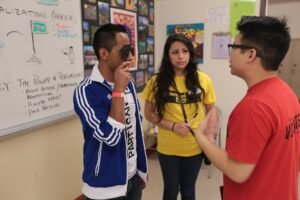
An interpreter helps a man in the Vision area at a pre-COVID 19 Clinic in SW Portland
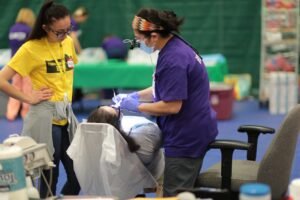
Translators are needed in every area to make sure each Clinic guest receives the best care possible.
From Needing an Interpreter, to Becoming One
My family immigrated here when I was five years old, so at home we only spoke Spanish. At the time, I was like, ‘why are we doing this, there’s no need, I want to be able to speak English well and be up to par with my classmates.’ Now I’m really thankful that my mom had us do that because my Spanish compared to the general public, I can tell that there’s a huge difference in conjugating verbs and things like that. Our mom really instilled speaking Spanish into my siblings and I, and I’m really happy because it was a huge benefit for me.
For two whole years after coming here I didn’t understand anything, but I was able to learn. In high school I transferred to Lincoln High School, because they have a Spanish Immersion program. I was actually really proud of that achievement because it’s one thing to speak Spanish, but it’s a whole different thing to learn culture, grammar, literature, and everything in Spanish. When I went in I thought it would be easy because I knew how to speak Spanish, but it was completely not what I expected. But it was fun as well, because I got to learn a lot. I definitely appreciated it because that Spanish Immersion program is hard to get into, and I was lucky to get that opportunity.
After high school when I moved out I was literally on my own. It kind of felt like it was me against the world, but after receiving those services I realized it wasn’t just me. There were a lot of other people also struggling and we were all just trying to do the best we could.
I do remember, even when I was a patient at the Clinic, seeing there were other people who needed help. And I knew my Spanish was good but at that time I didn’t really know anything about dental or medical procedures. My Spanish was limited to conversation and general things and I couldn’t tell you what the root canal procedure was going to be like, or describe your vital signs, or give any medical diagnosis that someone might need to talk about with a provider. I didn’t know any of those things, but even as a patient I was trying to help those around me with their paperwork because sometimes there aren’t enough interpreters.
“I did not want to be a professional [interpreter] unless I knew I was going to be able to interpret correctly because I could literally be interpreting either someone’s prognosis of death, or something small. These Compassion Clinics definitely prepared me in a way, as well as the other free clinics I’ve volunteered at.”
A lot of times it’s up to the kids who are with the parents to try and break the language barrier. But it’s a lot of struggle for the kids to do, because they’re put on the spot. I didn’t want the kids to have to go through that struggle, so I stepped up. I started with registration, and then I moved up to hospitality, taking people to the services they needed. And then I started learning dental and medical terminology. Little by little, I integrated myself into these different areas. And then I was like, “Okay, I feel more comfortable doing this now.”
Because the Clinics aren’t every weekend, in between events I would go to the library and get some books and learn new vocabulary. I would also go online and look at medical forms, going line by line and asking ‘what do I not know on this form?’
It has definitely been a work in progress. Like I said, I’ve only been a professional these past few years. Before that I was just practicing by going to clinics, or by helping my family. I’d go anywhere I could to try and practice. That was the biggest thing for me–I did not want to be a professional unless I knew I was going to be able to interpret correctly because I could literally be interpreting either someone’s prognosis of death, or something small. I don’t want to give a patient bad news when they don’t have bad news. These Compassion Clinics definitely prepared me in a way, as well as the other free clinics I’ve volunteered at.
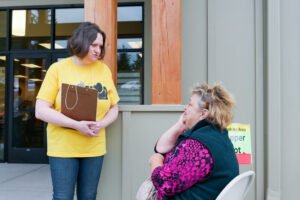
Volunteers on the Interpreter team can get to know guests while waiting to receive services.
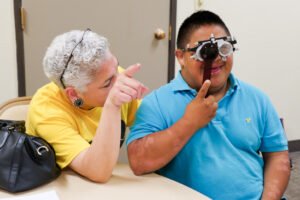
It’s important to know the correct terminology to be able to translate in each area of the Clinic!
Helping Remove Barriers to Health Through Language
One of the things that really inspired me to become an interpreter is the fact that many of our people are undocumented and it is a huge barrier for accessing medical coverage.
It was one of the biggest things for me personally because I’m also undocumented. I’m here through DACA right now (Deferred Action for Childhood Arrivals), so I’m very limited on what I can do. I can get insurance through my employers, so I rely on an employer to get health coverage. But as a self employed interpreter, I couldn’t go to the market and get my own insurance. We’re not allowed to; even if we could afford it we can’t purchase it.
It was a big moment for me when I learned that because it didn’t make much sense, especially since I came here at five years old and Oregon is all I know. I had to learn the hard way after I hit eighteen about the things I couldn’t do. I wouldn’t have even been able to go to college or work unless I got DACA because I have no documentation. There’s so many barriers that I’ve had to go through, and I didn’t want people who came to the Clinics who were undocumented to feel that pressure.
There was this one individual I was helping at a Clinic who had just recently moved to Oregon. He didn’t have a way to access health care because he was undocumented. He told me that he needed health insurance, and that he had been on this thing in another state and that he needed certain medications. We talked to a provider and I let them know the situation. Thankfully the provider actually had places he could go to that don’t ask or require documentation, and they allow you to pay on a sliding scale or apply for their programs.
It’s really hard when you’re moving from state to state to know how health coverage works. This person was already worried and kind of panicked and like, ‘I don’t know where to go to get this medication. I don’t qualify for any state health insurance or any insurance and I’m trying to find a job but I’m undocumented so there are all these barriers.’ I hate to see so many people having to jump around hoops just for something as essential as healthcare.
The provider at the time knew exactly where he could send him, and where he could get the prescriptions he needed, because I believe this patient had cancer in the past and that’s why he was taking them. That in itself made me feel really good because not only did I learn about new clinics that can help undocumented people, but we were able to get him the medication that he had just run out of.
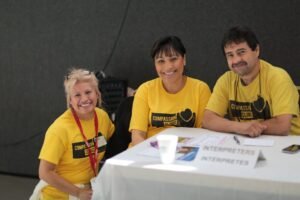
At large Compassion Clinics, you can always tell the interpreting team by their bright yellow shirts and sunny smiles!
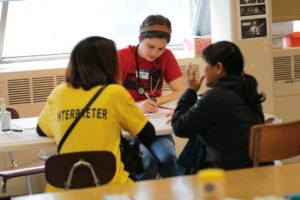
The Interpreting team is an essential part of every Compassion Clinic.
Six Years Later and Still Volunteering
One of the reasons I do this is for my family. Like I said, we’re a family of immigrants. Besides my cousins and siblings that have been born here, most of them are undocumented, and sometimes the health insurance that they have from their employer isn’t enough to cover everything.
So it’s really important to me that, whenever they need something from a Clinic, that I have a way to feel like I’m doing the best I can to give back. It’s kind of my way to pay others back for the help that they’re giving my family.
I also want to keep on practicing my interpreting skills, and a way that I can do that is with the clinics. It’s always fun, I always get to meet new people and I make connections, so it’s those little things that have really made me want to come back every time.
“I’m passionate about helping people. I always want to be able to help someone, even if it’s in the smallest of ways. When we gather at a Compassion Clinic we share the same interest: we want to help people, we want to help our community. We welcome everyone.”
But more importantly, I do it because there’s no monetary value in it. I like it. Sure, it feels nice to get paid, but my sole purpose in becoming an interpreter is to help. It’s about helping the community, I couldn’t really care less about the money. I want to give back to the community because I grew up in such a way that people were always there for us. When we came here, my mom was working two jobs, she was barely home. We were left at home most of the time, and we had neighbors and family come in and give us food. Sometimes we couldn’t even go and get new clothes for school because there wasn’t money for it. So we would go to churches, things like Compassion Clinics, and we would wake up at 6am and wait in line just for a pair of sneakers or for a meal. So having grown up in that environment, knowing that I can also help someone who’s experiencing that helps me have peace, like everything that I went through was worth it. I want to make it worth it for somebody else, and I want them to know there’s nothing to be ashamed of.
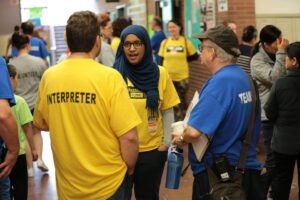
Depending on the demographics of the Clinic location, interpreters with a variety of language skills are needed.
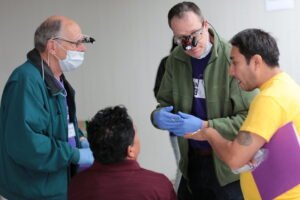
An interpreter is an important relational bridge between health professionals and Compassion Clinic guests!
How Shared Purpose Can Create Unity
If you’re considering volunteering, I would say you won’t regret it. You will find yourself in a welcoming environment, and you’ll find yourself growing from the patients and the volunteers themselves, because you get to learn a lot about people. Everyone is there with a good heart, everyone is there because they want to help.
I grew up religious, but I’m not affiliated with a church now. I mean, the way I tend to think about it is that we all have our opinions, we all have things we’re very passionate about. I’m really respectful about everyone’s point of view. I think that if we’re able to respect each other, there’s no reason for us to feel uncomfortable or left out.
I’m passionate about helping people. I always want to be able to help someone, even if it’s in the smallest of ways. When we gather at a Compassion Clinic we share the same interest: we want to help people, we want to help our community. We welcome everyone. That’s what Christianity and most religions are: we welcome everyone, regardless of who they were in the past, who they are right now, or who they will be in the future. I just kind of look at it as we have some shared interests, and we’re here for the same goal: we want to love everyone.”
To learn more about Compassion Clinics, including how to become a volunteer, please visit us here! In addition to interpreters, Compassion Clinics are made possible by local volunteers with all kinds of skills, gifts, and passions. The challenges in our neighborhoods are overwhelming for just one person, church, or organization, but together we can tackle them and can love and serve our neighbors in big ways!


